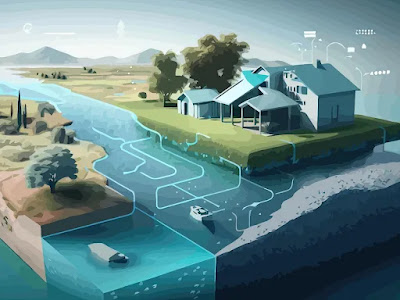In the quest for sustainable urban development, the optimization of energy efficiency in water distribution systems is paramount.
 |
| Source Credit- Inc42 |
As cities continue to grow and evolve, the demand for water management solutions that are both effective and environmentally friendly has never been greater.
Enter Artificial Intelligence (AI), a game-changing technology that is revolutionizing the way we approach water distribution in smart cities.
In this article, we delve into the multifaceted role of AI in optimizing energy efficiency within smart city water distribution systems, exploring its benefits, challenges, and real-world applications.
Understanding the Challenges of Water Distribution
Water distribution systems are the lifelines of modern cities, responsible for delivering clean and reliable water to millions of residents and businesses. However, these systems often face significant challenges that can hinder their efficiency and sustainability.
Aging infrastructure, leakage, pressure management, and energy consumption are just a few of the issues that water utilities must contend with on a daily basis.
Inefficient water distribution not only wastes precious resources but also contributes to higher energy consumption and increased operational costs.
Enter AI-Transforming Water Management
AI has emerged as a powerful tool for optimizing water distribution systems, offering innovative solutions to some of the most pressing challenges faced by cities around the world.
By leveraging advanced algorithms, machine learning, and real-time data analytics, AI can analyze vast amounts of information to optimize the operation of water networks, improve energy efficiency, and reduce waste.
From predictive maintenance to demand forecasting, AI-driven technologies are revolutionizing the way we manage water resources in urban environments.
Harnessing Data for Optimization
At the heart of AI-driven water management is data – vast streams of information collected from sensors, meters, and other sources within the water distribution network.
AI algorithms analyze this data in real-time to identify patterns, detect anomalies, and make informed decisions about how to optimize the flow of water through the system.
By harnessing the power of data analytics, water utilities can proactively identify and address issues before they escalate, leading to more efficient operations and reduced energy consumption.
Predictive Maintenance
One of the key applications of AI in water distribution systems is predictive maintenance.
By analyzing historical data and sensor readings, AI algorithms can predict when equipment such as pumps, valves, and pipelines are likely to fail, allowing utilities to schedule maintenance activities proactively.
This not only reduces the risk of costly downtime but also extends the lifespan of critical infrastructure, ultimately leading to significant energy savings and improved reliability.
Pressure Management
Optimizing water pressure is another area where AI can make a significant impact on energy efficiency.
By dynamically adjusting pressure levels based on demand and network conditions, AI-powered systems can minimize energy consumption while ensuring consistent water delivery to consumers.
By reducing unnecessary pressure in the system, utilities can decrease the workload on pumps and other equipment, leading to lower energy costs and reduced wear and tear.
Leak Detection and Prevention
Leaks in water distribution networks can result in significant energy losses and wasted resources.
AI algorithms can analyze data from sensors and meters to detect leaks in real-time, allowing utilities to take swift action to repair them before they escalate.
By identifying and repairing leaks promptly, utilities can minimize water loss, reduce energy consumption, and improve the overall efficiency of the distribution system.
Real-World Applications and Success Stories-
To illustrate the real-world impact of AI on energy efficiency in smart city water distribution systems, let's explore some success stories and applications.
Singapore's Smart Water Grid
Singapore has implemented a smart water grid powered by AI to optimize water distribution and reduce energy consumption.
By leveraging real-time data analytics and predictive algorithms, Singapore's water utility has achieved significant improvements in energy efficiency, leakage reduction, and operational reliability.
Thames Water's Leak Detection Program
Thames Water, the UK's largest water utility, has deployed AI-powered leak detection systems to identify and repair leaks in its distribution network.
By analyzing data from acoustic sensors and pressure meters, Thames Water has been able to reduce water loss, lower energy consumption, and improve customer satisfaction.
Barcelona's Water Efficiency Initiative
The city of Barcelona has launched an ambitious initiative to improve water efficiency and sustainability through AI-driven technologies.
By integrating AI into its water distribution network, Barcelona has achieved substantial energy savings, reduced water waste, and enhanced resilience to climate change.
Final Thoughts
In conclusion, AI has the potential to revolutionize energy efficiency within smart city water distribution systems, leading to more sustainable and resilient urban infrastructure.
By harnessing the power of AI-driven technologies, water utilities can optimize operations, reduce energy consumption, and minimize environmental impact.
As cities continue to grapple with the challenges of urbanization and climate change, AI offers a promising solution for building smarter, more efficient water systems that meet the needs of both present and future generations.
AI, energy efficiency, smart city, water distribution systems, optimization, sustainability
Edited By- L.A.Adithya
This article has been authored exclusively by the writer and is being presented on Eat My News, which serves as a platform for the community to voice their perspectives. As an entity, Eat My News cannot be held liable for the content or its accuracy. The views expressed in this article solely pertain to the author or writer. For further queries about the article or its content you can contact on this email address -lalgudi469@gmail.com





.jpeg)




0 Comments